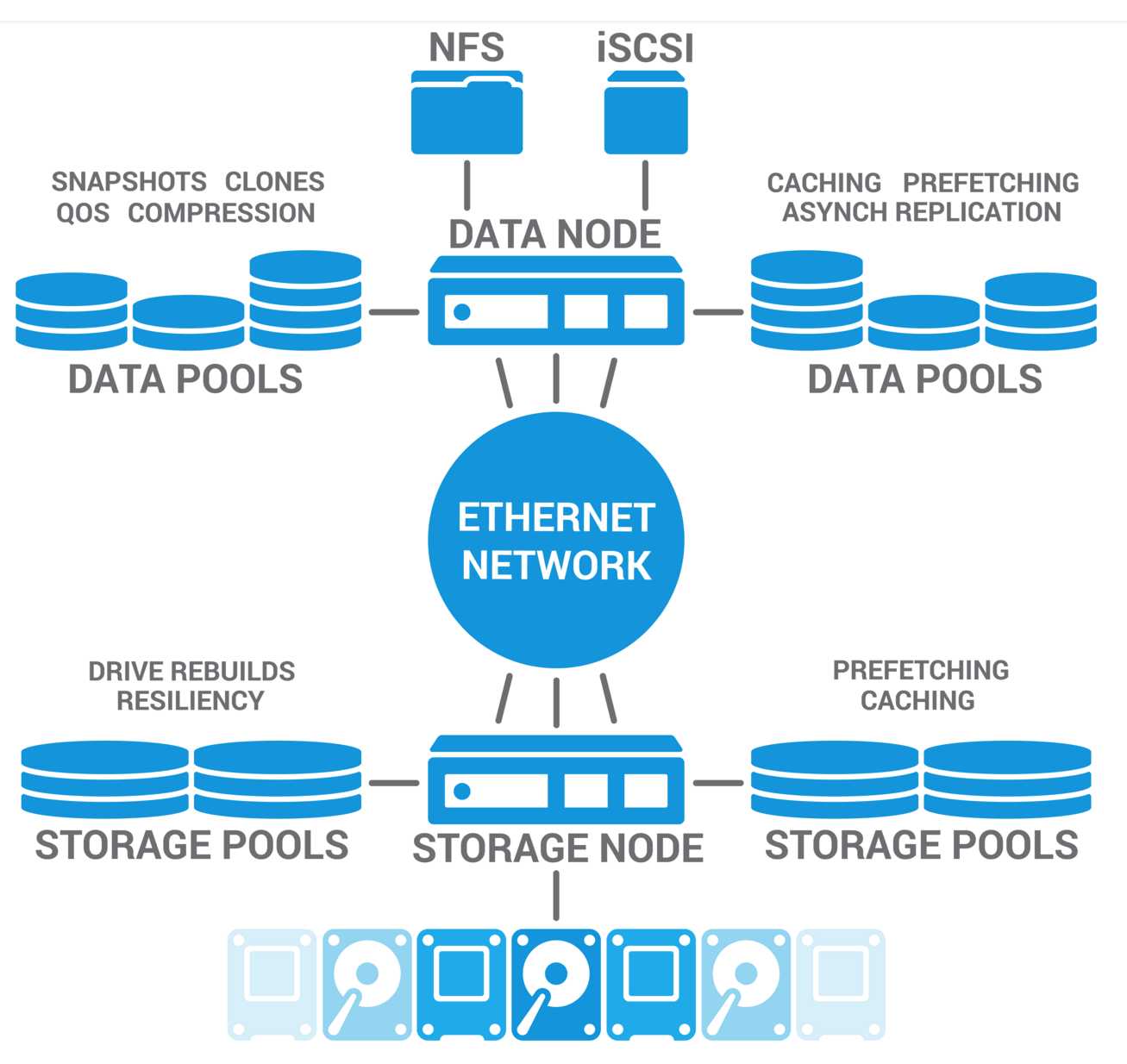New Start-Up Just Discovered: InterModal Data
Involved in "disaggregated storage" software solution for enterprise
This is a Press Release edited by StorageNewsletter.com on December 9, 2015 at 2:47 pmInterModal Data Inc. unveiled a storage approach that delivers the level of scalability, flexibility and cost effectiveness to enterprises that hyperscale companies such as Facebook, Amazon and Google have achieved.
The InterModal Data solution, which is available, is distributed system software purpose-built to enable a disaggregated commodity hardware architecture. The disaggregated architecture design increases resource utilization, driving a 4-10x reduction in required hardware to meet a given performance requirement when compared with traditional solutions.
InterModal Data’s distributed storage software solution can scale to support millions of workloads and billions of files. The software allocates resources on a per-workload basis in order to meet specific performance requirements, while using the lowest cost resource. The disaggregated architecture physically separates the storage controllers from the shelf, creating data nodes and storage nodes that are logically connected over Ethernet. The software intelligently governs the use of RAM and flash caches on every node, optimizing the ability to service the active data set. When conditions or requirements change, the software quickly reallocates resources across the Ethernet fabric to dynamically meet workload requirements.
“The need for more flexible and affordable enterprise storage that is granular at a workload level is well understood,” said Mark Peters, practice director and senior analyst, ESG. “But the semantics – of software defined storage and disaggregation – can sometimes obscure the true IT and business values. The kind of benefits that can be delivered by such newly-imagined approaches, which InterModal Data is now delivering, mean a more responsive, scalable, less expensive and better-tuned storage infrastructure. This is not only an attractive proposition but a business necessity.”
The disaggregated architecture enables enterprises to realize cost efficiencies and to scale at a very granular increment. This approach eliminates many of the bottlenecks that exist in traditional architectures, increasing the utilization of all components – CPU, RAM, SSD, HDD – in the solution. The result is, depending on the workloads supported, a 4-10x reduction in cost to deliver the same performance as traditional alternatives.
“I have all flavors of customers that require different levels of service. In our proof of concept, the InterModal Data solution met all of those individual requirements in a cost effective way,” said Tim Dufour, CEO, RackForce Networks, Inc. “The insights we gained on our storage system as a whole was an incredibly valuable benefit for our DevOps team.”
InterModal Data qualifies all hardware to ensure quality and predictability, while offering a perpetual software license. This allows customers to buy future generations of hardware directly from qualified suppliers, without having to repurchase the software.
“Within the storage market, three fundamental challenges exist – scalability, efficiency and flexibility – and InterModal Data is working closely with forward thinking enterprises to solve these critical issues,” said Dave Kresse, CEO, InterModal Data. “The result is a storage solution that achieves unprecedented utilization rates for storage infrastructure. This empowers enterprises to deliver at scale the performance they require at up to 10x cost savings compared to traditional solutions, while still delivering enterprise reliability, availability and serviceability.”
“With companies struggling to address their changing storage requirements in a web scale age that requires supporting millions of simultaneous workloads, the storage industry is completely ripe for disruption,” said Arun Taneja, founder, The Taneja Group. “Organizations ranging from large enterprises, broadly deployed SaaS, technical computing and managed hosting are looking for a scalable solution that provides a granular QoS at a workload level, and has a flexible architecture to quickly reallocate resources and move data.”
Comments
More on InterModal Data
Born this year, the company, based in Santa Clara, CA, has raised $4 million to date from investors including Menlo Ventures, Azure Capital Partners and Allegis Capital. The fundraising form D was filed on June 19, 2015.
The main executives come from defunct Coraid that closed doors in early 2015 after getting as much as $114.3 million in financial funding. The Californian firm developed SAN using ATA over Ethernet protocol but never was a real force in the storage industry. Last May, The Brantley Coile Company bought all the Coraid's EtherDrive SRX and VSX assets, providing support to the abandoned Coraid customers.
 - CEO Dave Kresse was most recently as CEO of Coraid. Prior to that, he was CEO of application performance and security vendor Mu Dynamics, which was acquired by Spirent. Prior to Mu Dynamics, he served as VP and GM of the NetApp storage management and application integration business, where he drove revenue growth and led the first solution integration effort between NetApp and VMware. Before joining NetApp, he held positions at Leapfrog Enterprises, PowerSchool, Inc. (acquired by Apple Computer), and Bain & company. He also held a board seat as an independent director at Embrane, a software-defined network services company acquired by Cisco.
- CEO Dave Kresse was most recently as CEO of Coraid. Prior to that, he was CEO of application performance and security vendor Mu Dynamics, which was acquired by Spirent. Prior to Mu Dynamics, he served as VP and GM of the NetApp storage management and application integration business, where he drove revenue growth and led the first solution integration effort between NetApp and VMware. Before joining NetApp, he held positions at Leapfrog Enterprises, PowerSchool, Inc. (acquired by Apple Computer), and Bain & company. He also held a board seat as an independent director at Embrane, a software-defined network services company acquired by Cisco.
- CTO Nakul was previously CTO of Coraid after his start-up Yunteq (a cloud orchestration company) was acquired by Coraid in 2011. He is listed as co-inventor on 29 issued patents. Earlier, he co-founded Fabric7 Systems, which developed a hardware-partitionable x64 servers with virtualized fabric-based I/O and integrated L2-7 services. He has also held technical positions with Akamai, CacheFlow (BlueCoat) and Sun.
- VP of WW sales Keith Carpenter was VP of WW sales at Coraid. Prior to that, he was VP sales, Americas for Virident Systems (acquired by HGST, a Western Digital company). Before that, he co-founded and served as VP sales at Cache IQ, a start-up developing flash based technologies with software for accelerating I/O demanding applications. Cache IQ was acquired by NetApp in November 2012. Prior to Cache IQ, he was the VP sales for Storspeed, a private start-up based in Austin, TX. He had been formerly with NetApp since 2001, most recently as sales director in the Central United States where he grew the operations from $80 million to a $220 million business. He has also held sales positions with Auspex Systems and EMC Corporation.
The start-up has recruited two advisors with deep storage background:
- Greg Dahl was founder of CacheIQ and StorSpeed. He held executive roles at NetApp, StorageTek, Banderacom, and Tricord. He holds several patents related to storage and caching technology.
- Matt Ahrens was co-founder of the ZFS team at Sun Microsystems, designing and implementing major components of ZFS including snapshots and remote replication. He holds 21 patents in the area of file systems management.
Like InterModal, there is now a lot of start-ups and more mature storage companies in scale-out NAS for unstructured data using commodity hardware. Each one has its own vocabulary for the solution: "dispersed", "ring", "data-aware scale-out NAS", "object storage software", "web scale storage", "disaggregated", etc.
InterModal software leverages a "disaggregated" hardware architecture that utilizes commodity hardware components that you buy directly from the manufacturer or channel partner. The storage system is physically separated into component functions that are logically connected over Ethernet.
The storage system is made of two entities:
- - Storage pods contain SSDs and/or HDDs combined into resilient devices to hold and protect data at rest; each pod consists of two highly-available storage nodes sharing access to the drives. Each node provides either SSD or hybrid storage pools with attendant RAM and optional flash cache.
- - Data directors are stateless data access and management entities with RAM and flash caches that provide network-accessible file and block data stores via NFS and iSCSI. Each director consists of two highly-available nodes sharing access to write-ahead logs.
Storage pods and data directors are interconnected via an Ethernet fiber network with multiple parallel and redundant paths, using an internal self-managing protocol. A pod can provide capacity to any director, and a director can consume storage from any pod. Capacity is scaled seamlessly by adding more nodes into the network, and IO is scaled by adding new directors into the network where existing pools may be migrated to or new pools provisioned.
Two key benefits, according to the start-up:
- - Avoids trapping unutilized resources within physical infrastructure bottlenecks
- - Enables granular, incremental scaling at component level














 Subscribe to our free daily newsletter
Subscribe to our free daily newsletter

